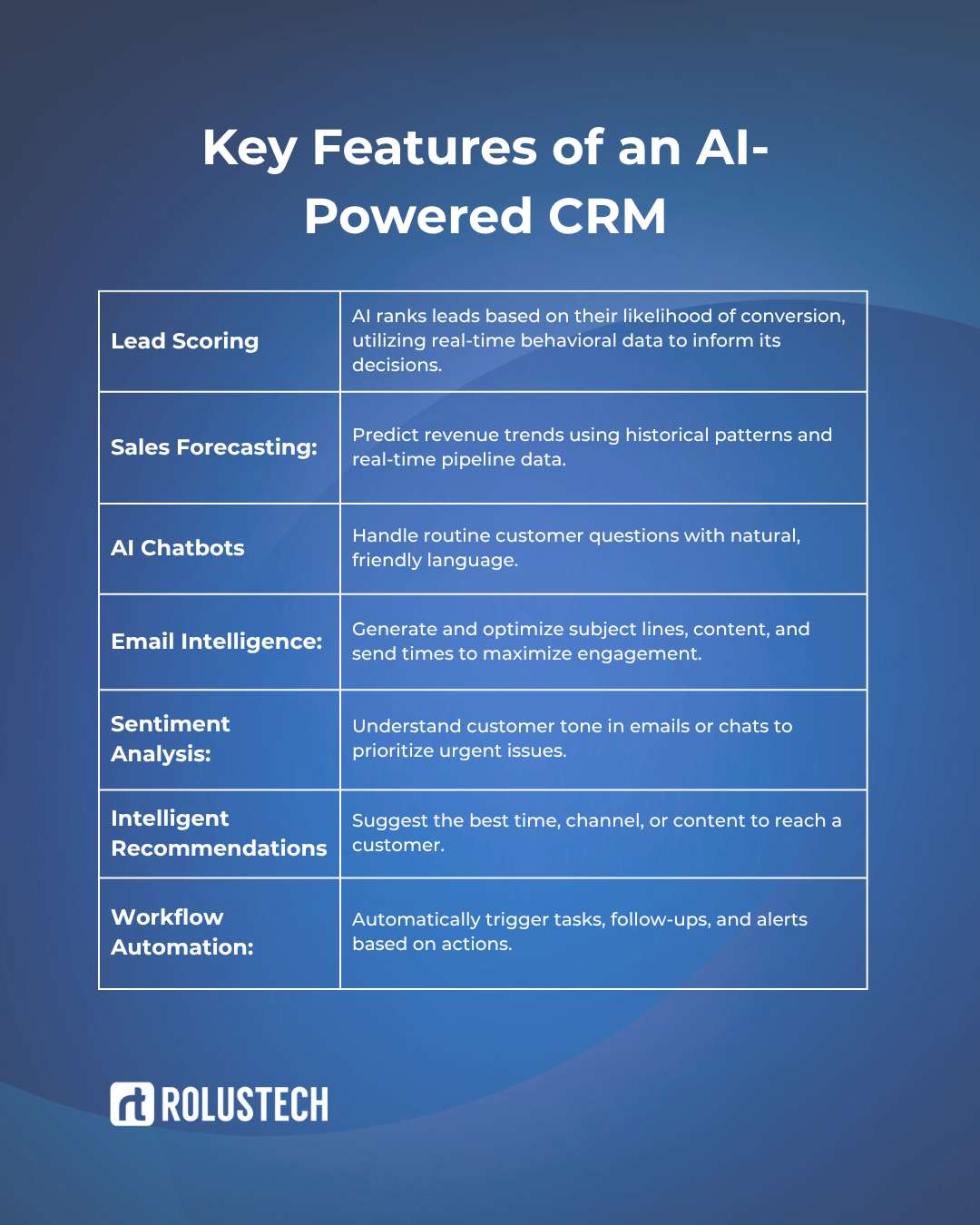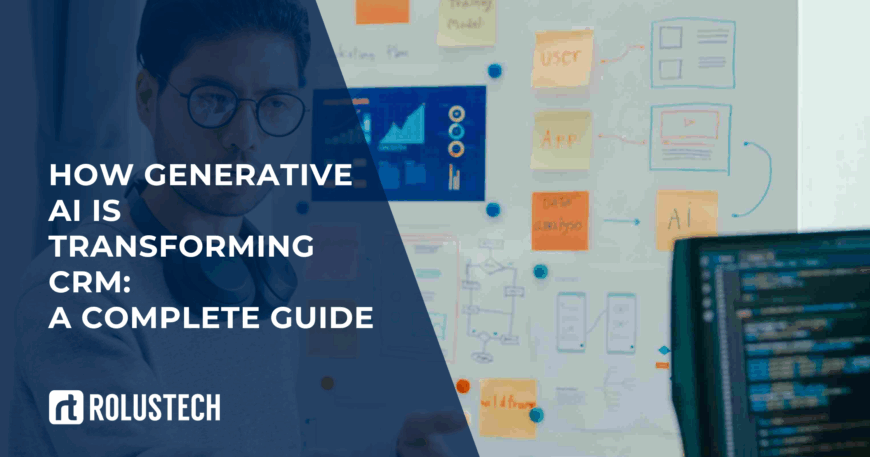The Rise of AI in CRM
Customers today don’t just want excellent service, they want instant, personalized experiences across every platform. They expect companies to remember their preferences, resolve issues promptly, and anticipate their needs in advance. This shift has prompted businesses to adopt more innovative tools, and AI CRM is at the forefront. Customer Relationship Management tools have always helped track sales, leads, and support.
But with AI built in, CRMs are no longer just data trackers, they’re intelligent assistants that guide decisions. AI is now analyzing customer behavior, crafting tailored responses, and even predicting when a lead is likely to convert. Imagine a sales tool that tells you the optimal time to call a prospect and automatically generates the perfect email.
Or a support chatbot that not only responds instantly but understands tone and urgency. That’s the power of CRM with AI, and it’s not a future concept, it’s already here. A recent study by Salesforce showed that over 50% of high-performing sales teams use AI in some form.
As businesses compete in crowded markets, these tools give them a competitive edge in terms of speed, efficiency, and insight. Whether you’re running an e-commerce site, managing a real estate agency, or selling SaaS software, an AI-powered CRM can revolutionize how you work. It’s not just about doing more, it’s about doing it smarter.

What Is an AI CRM and How Does It Work?
An AI CRM is a system that enhances traditional customer relationship management tools with artificial intelligence technologies. This means it not only stores customer data but also learns from it, analyzes it, and acts on it. These CRMs use machine learning, natural language processing, and predictive analytics to understand customer behavior.
Let’s break it down: AI observes patterns in customer data, such as how often someone visits your site or opens emails. Then, it predicts what that customer might do next and suggests the best way to respond. Over time, the system becomes increasingly intelligent. It adjusts its recommendations based on what worked.
Some AI-based CRMs also integrate with communication tools like email, social media, and chat. That means you get a unified view of every customer interaction and innovative suggestions for what to do next. For example, if a lead opens your last three emails but doesn’t click, the AI might suggest a phone call instead. It’s like having a digital sales coach sitting inside your CRM.
Benefits of Using CRM with AI Capabilities
CRM systems with AI capabilities deliver measurable improvements across departments, particularly in sales, marketing, and support.
- Increased Efficiency: Repetitive tasks, such as logging calls or assigning leads, can be automated to enhance productivity and efficiency.
- Improved Accuracy: AI reduces human error and ensures cleaner, more reliable customer data.
- More intelligent Decision-Making: With AI-driven insights, teams make better, faster decisions.
- Predictive Capabilities: AI forecasts future sales and identifies customers at risk of churn.
- Faster Response Times: AI chatbots reply instantly to customer questions, even outside of business hours.
- Personalized Communication: AI tailors messages to individual users based on their past behavior and preferences.
Imagine your sales team receiving a daily list of high-intent leads, ranked by likelihood of closing. Or your support team uses AI to draft accurate responses that accurately reflect the brand’s tone and history. That’s not just efficient. It’s transformative.
Key Features of an AI-Powered CRM
What makes an AI-powered CRM different from a traditional one? These features:

Together, these features create a CRM that works with you, not just for you.
How Generative AI Enhances Customer Relationship Management
Generative AI combines creativity and automation within your CRM. Instead of just analyzing data, it generates original content tailored to customer needs.
- Sales Emails: AI can draft personalized messages in seconds based on past communication.
- Chat Support: AI drafts replies that sound human, handles objections effectively, and reflects genuine empathy.
- Marketing Copy: Generate social posts, ad headlines, or email content that fits your tone.
- Data Summarization: Turn long customer histories into one-paragraph summaries for agents.
Generative AI enables your team to work faster without compromising the human touch. It helps new representatives perform like veterans and provides managers with clear insights with minimal effort. And because it learns from interactions, your CRM grows more intelligent with every conversation.
Industries Benefiting from AI-Based CRM Systems
AI-based CRMs are not one-size-fits-all. Each industry tailors AI features to fit unique needs.
- Retail: AI recommends products based on past purchases or online behavior.
- Healthcare: Automates follow-up messages and reminds patients of upcoming visits.
- Finance: Detects fraud patterns, automates KYC processes, and boosts lead conversion.
- Real Estate: Helps agents manage leads, predict buyer intent, and schedule viewings.
- B2B SaaS: Predicts churn, optimizes onboarding, and helps close enterprise deals.
For example, a fitness app might use an AI-powered CRM to re-engage users who stopped logging workouts. A bank can detect when a customer may need a loan based on their spending behavior. The possibilities are endless and constantly evolving.
Choosing the Best AI CRM for Your Business
With numerous options available, how do you determine the best AI CRM for your team? Start by listing your must-have features, such as lead scoring, chatbot integration, and email automation. Then compare platforms on ease of use, pricing, and customization. Some top options include:
- Salesforce: Deep AI integration with Einstein GPT and extensive third-party app support.
- HubSpot: Ideal for SMBs, offering intelligent automation and excellent reporting.
- Zoho CRM: Budget-friendly with built-in Zia AI assistant.
- Freshsales: Offers AI lead scoring and sales sequences for growing businesses.
Always test with a trial account or demo before making a commitment. Your team’s workflow should improve, not get more complex. And remember, the best AI CRM is the one your team will use.
Future Trends: Where AI and CRM Are Headed
What’s next for AI CRM? These trends are gaining speed:
- Hyper-Personalization: CRMs will deliver unique content, offers, and experiences to each user.
- AI Copilots: Tools like Microsoft Copilot will assist reps live during sales or support conversations.
- Voice CRM: Talk to your CRM using natural voice commands to schedule tasks or log notes.
- Emotion Detection: AI will read tone and body language during video calls to assess customer sentiment.
- Autonomous CRM: Fully automated systems that run campaigns, respond to customers, and optimize pipelines.
These trends aren’t far off. Some are already here, reshaping how businesses connect with people. If you prepare now, your team will be ready to lead, not follow.
Is Your CRM AI-Ready?
We’re entering an era where AI CRM tools are no longer optional, they’re essential. Businesses that adapt will gain a serious edge in productivity, personalization, and performance.
Whether you’re chasing leads, serving clients, or growing brand loyalty, AI will help you do it better. Start by reviewing your current CRM. Does it support automation, predictions, and content generation? If not, it’s time to consider an upgrade or risk falling behind.

Embrace the Future with Salesforce Lightning
If you’re ready to future-proof your CRM, consider a platform like Salesforce Lightning. It offers powerful AI tools, seamless integrations, and the flexibility to scale as your business grows. From intelligent workflows to generative email support, it gives your team everything they need to succeed. In a world that moves fast, let your CRM keep up. The AI-powered CRM revolution is here. Are you ready to join it?
FAQs
Q1: What is the difference between a traditional CRM and an AI CRM?
Traditional CRMs store data. AI CRMs analyze and act on it in real time.
Q2: Can small businesses use AI-powered CRM systems?
Yes, many AI-based CRM platforms offer affordable plans for startups and small teams.
Q3: What are some real AI CRM features?
Lead scoring, email generation, chatbots, predictive analytics, and automated follow-ups.
Q4: Is generative AI reliable for customer support?
Yes. It provides quick, on-brand responses that reduce resolution time and boost satisfaction.
Q5: Which is the best AI CRM in 2025?
Salesforce and HubSpot lead the pack, but Zoho and Freshsales are excellent for smaller teams.




